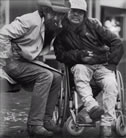Use Your Rights to Fight Poverty!
A Workshop on the International Covenant on Economic, Social and Cultural Rights (ICESCR)
Created by Low Income Families Together (LIFT), KAIROS, and the National Anti-Poverty Organization
Goals:
- To improve understanding of economic, social and cultural rights
- To discuss and document experiences of economic, social and cultural rights violations so that they can be presented to the Government of Canada and the United Nations Committee on Economic, Social and Cultural Rights
- To strengthen local action to protect economic, social and cultural human rights.
Time Required:
3 to 3½ hours (If you have less then 20 participants it can probably be done in 3 hours, if you have from 20 to 35 participants it will take longer.)
Suitable for:
Groups of up to 35 people, ages 16 and up; anti-poverty, church, school, union, women’s or other groups who are interested in poverty issues.
Materials you need:
Flip chart and paper, flip chart stand, name tags, markers, 8x11 cards, masking tape, colored dot stickers, 1-2 people to act as recorders (with laptop if possible), registration forms (names and contact information of participants, consent to use name or request for anonymity), photocopies of Summary of the International Covenant on Economic, Social and Cultural Rights for hand outs and a flip chart sheet with the key ICESCR Articles listed for posting.
You can get information about the International Covenant on Economic, Social and Cultural Rights from the following websites:
National Anti-Poverty Organization (www.napo.ca)
Low-Income Families Together (http://www.lift.to/)
UN Committee on Economic, Social and Cultural Rights (http://www.ohchr.org/english/bodies/cescr/index.htm)
Government of Canada, Heritage Canada, Human Rights Program (www.pch.gc.ca/progs/pdp-hrp/docs/cesc_e.cfm)
1. Introductions in Large Group (20 to 30 minutes)
Ask participants to introduce themselves and say a few words about what they hope to get out of this workshop. Introduce the workshop goals and steps. Negotiate any changes or adjustments to the goals and agenda in response to what people have said in the introductions. Consider doing one of the icebreaker exercises if you have time.
2. The International Covenant on Social, Economic and Cultural Rights: Why is it relevant to you? (30 minutes)
Brief presentation including:
- Concept of human rights
- Key international human rights covenants and treaties
- History of ICESCR and key rights
- Past reviews of Canada’s performance on ICESCR
Hand out Summary of the International Covenant on Economic, Social and Cultural Rights. Provide a brief period of questions and answers
3. ICESCR Articles: What are our priorities (15 minutes)
Post flip chart sheet and briefly review key articles of ICESCR. Hand out 3 sticky dots to each participant. Ask participants to think about their own experiences – and the experiences of others in their communities – and to stick their dots next to the article(s) that they feel are most violated in their communities.
Dots are counted and articles prioritized. Brief discussion and formation of small groups of about 4-6 people to look at key articles (each group focuses on one article or in the case of Article 11 you might have separate groups on the right to an adequate standard of living, right to food and right to housing).
4. Break (15 minutes)
5. Experiences on priority articles (45 to 60 min.)
Small groups are given two tasks:
- do a go around sharing an example of an experience they, or another community member has had, in relation to this right.
- suggest three changes or solutions that would help to alleviate their difficulties (each one is written in large letters on a single 8x11” card).
A recorder is present in each group, recording as much information as possible on flip charts, note pad or a laptop.
5. Report back (25 to 30 minutes)
A reporter from each small group briefly reports on violations of these rights experienced by people in this community that were shared in the small group, and 3 key actions/solutions to ensure that these rights are protected.
Have a general discussion focused on how the stories and evidence from people ’s experience in this community can be included in the Canadian NGO Report to the UN Committee on Economic, Social and Cultural Rights, how MPs on the Standing Committee on Human Resources, Skills Development and Status of Persons with Disabilities could be lobbied to hold hearings on Canada's report to the UN Committeee on Economic, Social and Cultural Rights and how a human rights framework can be used locally to further action for anti-poverty and social justice issues.
6. Next Steps, Evaluation and Closing (30 minutes)
Discuss how to follow-up on priority articles and actions. Set date for a follow up meeting to take next steps (i.e. if group wishes to advocate for economic, social and cultural rights solutions, or to prepare local follow up to UN Committee report on Canada). Bring the workshop to a close with a brief evaluation. If the group is less than 20 people go around the circle and give each person a chance to say something. If it is a larger group use a written form but give a chance for some people to share their responses orally in the large group.
Questions you might ask:
- What did you find most challenging or surprising?
- What do you take away with you from this workshop?
- What might have been done differently?
If appropriate close with a song.
